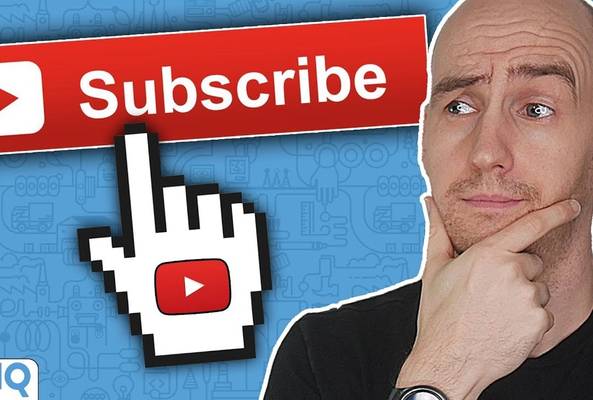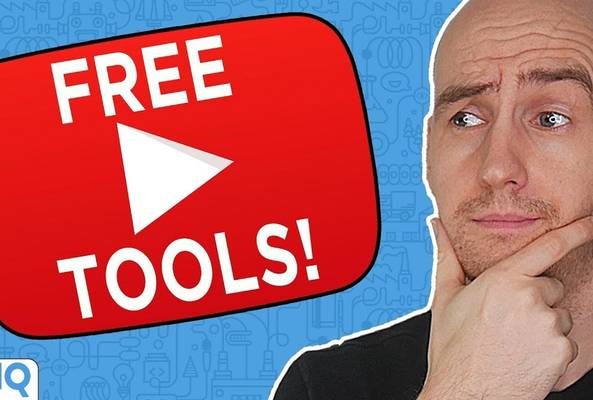Liron Segev, aka TheTechieGuy, is the Director of Customer Success at vidIQ, an internationally celebrated Digital YouTube Strategist working with some of the largest brands and YouTube influencers in the world. Over the past 20+ years, his work has taken him to South Africa, the UK, and the US where he frequently speaks at conferences and provides expert tech commentary for various print publications, radio, and TV while actively running his Tech YouTube Channel.
How to Grow a YouTube Channel: A Creators Story | TubeTalk 187 with Dave Maze
To be successful in YouTube in any niche, you have to have discipline, you have to have the commitment, and you have to have the vision. Today's guest has those in spades, and it's no wonder some of the world's biggest brands want to work with him. Let's dive in and get in behind the scenes and see what we can learn for our YouTube channel.
On this week’s episode of TubeTalk I’m joined by Dave Maze of Kinotika, the go-to YouTube channel for anything to do with cameras, reviews, tips and tricks. In this podcast you will learn:
- Why it's never too late to start a YouTube channel
- Why being a single brand ambassador might harm you in the long run
- How a running list of content ideas will keep you productive
- How to find a balance between creativity and analytics

Subscribe to TubeTalk: The Video Marketing Podcast!
TubeTalk has been informing video creators and marketers since 2014, and is one of the most respected and listened to podcasts in the online video industry. Subscribe today so you never miss an episode! You can find vidIQ's TubeTalk at:
How to Grow a YouTube Channel: A Creator Story: Full Transcript
Liron Segev: Dave, thanks for hanging out with us. I've got to start by telling you, I have seen your content grow. I've seen your content mature. What took so long to get onto YouTube? Do you think by waiting, you actually have an advantage when you did switch over to YouTube?
Dave Maze: Some of that maturity, like over those 10 years before I became a YouTuber, has all helped me now. If I just started straight out of high school from being a magician to figuring out how to be a filmmaker, like I don't know, part of me is like I should've started earlier, but then the other side is like, there's a lot of maturity that happened.
To answer your question, I think anybody can start where they are, if they have the awareness of, "I want to be a YouTuber." I just never thought YouTube was anything. I just saw Ryan Connolly on Film Riot and I was like, that's awesome that he's doing that. I don't really care to do that. I just want to be a filmmaker. You mentioned that everybody brings up Casey Neistat, but I think he really, for a lot of filmmakers, changed our perspective on YouTube, because now we have people like Levi Allen, obviously Peter McKinnon, Matti Haapoja now. These are real freelance, DPs, directors who traditionally, 20 years ago, probably would have done commercials, maybe music videos and films, and because Casey's showing us as a filmmaker, I can be a YouTuber, it's okay.
By the way, you can actually make a good living doing it. You can actually do what you want to do. Just lower the production value a little bit. We've seen a big kind of influx of filmmakers transitioning over to being YouTubers.
Liron Segev: Again, you don't have to be perfect. People have got lots of forgiveness on YouTube, and they want to see the raw element of this and they want to see the bloopers and they want to see that not everything is perfect. If you're living in a van in the middle of the desert and people come out with full makeup, you know they haven't showered in three days, you know it's fake and people don't respond. They don't respond to that. They respond to someone being real. Being real, I think, is a big, big thing on YouTube. Do you believe that's an important kind of element of finding your space in this world?
Dave Maze: I think so. I worked for a guy named Dave Ramsey. That was my corporate job that I had. If you're not familiar with Dave Ramsey, millions of people listen to his radio show. He teaches people how to get out of debt and stuff like this, but there's actually some polarizing things that he believes in his messaging that a lot of people sometimes agree with, sometimes disagree with, but he doesn't care. He sticks to his opinion. When I started doing these tech reviews, I saw some people being a little wishy-washy, being maybe manipulated by, I want to please this brand, or whatever.
It was actually a guy named Caleb Pike, DSLR video shooter, who told me "I don't work for the camera companies. I will not receive anything from them. I am working for my audience. That's who matters. It's not Canon or Sony or Nikon.” Sure, I can be friendly with the employees, I don't want to be a jerk, but I'm not here to please them. I'm here to give my opinion and have a true opinion and stick to it and give that to my audience," because that's first off, people are attracted to people with an opinion whether they agree or disagree.
It doesn't matter because if you disagree, you're going to let me know in the comments, which boosts my engagement. If they agree, they become a fan, right? That's kind of the big realization I had was I need to have an opinion on something, stick to it and not be a jerk about it. But that will gather a niche following of people who agree with me, but then also people who disagree. They can comment if they want and leave a dislike. There's always dislikes, like no matter what. I post a video and then in five minutes, there's like two dislikes.
Liron Segev: How do you balance between working with a brand, and you have to do a review on their competitor. Do you find it a bit awkward because you're like loyal to the one brand because you really love their gear, but you still want to give a fair review of their competitor?
Dave Maze: Sure. Well, I think there's two answers to that. First off, if you're somebody like Jason Vong, who's a good friend of mine, he's kind of like the Sony guy. If he picked up a GH5 or a Canon, his audience would kind of be like, "What the heck?" He actually told me that he reviewed the GH5 and everybody was like, "Why are you doing this?" There is that aspect of it. If you're a Canon guy, like Peter McKinnon who chooses to switch to Sony, like ... Well first off, that would blow up the internet. Everybody would freak out, but it's almost like you wouldn't see that happen.
Because I'm an unbiased ... I feel like I'm a journalist rather than I'm dedicated to one brand. I hope that people understand that as a journalist it's my job to just kind of be unbiased.
Liron Segev: At the end of the day, like on my channel, I do tech reviews, right? I've got to remember, just as you do, people are going to make a buying decision, or you're going to help someone make a buying decision, either for or against. I always say, look, in my experience, and this is my use case for it, this worked really well, and that stuff really didn't work well.
Now if somebody else has got a different user experience or use case, that may or may not work for them, but at least I'm giving it from a perspective. Now you've got enough information to say, "Okay, I can kind of lean in towards one direction." I think it would be very disingenuous of both of us to say, "Well, brand X sent me this gear, so it's amazing and there isn't a single negative." It doesn't really kind of work that way.
Dave Maze: Exactly. I don't just put something negative in for the sake of negativity. I might go at it with an angle that might be attractive story-wise, but overall, if there's something that's really bad, I'm going to point it out. If it's really good, I'm going to point out too. I think a lot of people in my niche accuse us of being paid by these companies, and it's just not true. The truth is that once you get to a certain level, it is easy to get a hold of gear, but it doesn't mean that you're going to keep it.
I have a deal with B&H and they send me pretty much whatever I want, which is great because B&H is kind of an unbiased entity. I really like working with them because it's not Sony giving me a camera. It's B&H giving me a camera and they're unbiased. They sell everything.
Liron Segev: Do you find that companies appreciate the fact that you've pointed something out and maybe they'll fix it in the next firmware upgrade, things of that nature?
Dave Maze: Yeah, absolutely. It's actually really amazing to see what is happening in the industry right now. For example, we just brought this camera up, the G7 X Mark III from Canon, that's been one of the most popular vlogging cameras for the last couple of years. They haven't updated it in a long time. I think it's been three years or something, but this new iteration is clearly designed with the suggestions that YouTubers gave. The screen has been reinforced because people were breaking the screen. They added a mic input jack, which everybody in the whole wide world wanted. They're actually doing things.
I see that with Sony. They added a flip screen with the new a6400. Everybody wants a flip screen. It's interesting to see people make changes because these cameras are made by engineers, very smart, brilliant engineers. They're not necessarily using the camera daily. When we have, "Hey, when I use this camera, it overheats and this thing happens or whatever," they're like, "Oh, cool." If a bunch of people say that, then hopefully they can address it. It's pretty cool.
Liron Segev: It makes sense for them to do it because they're getting feedback from their customers who just want a better product. When they make the better product, odds are pretty darn good that if this is the eight things you wanted fixed and they are fixed, you're going to buy that next product. It just kind of makes complete sense.
When you're planning out your content, how much of your analytics and your audience and your comments do you take into account versus like your content schedule that you already have set?
Dave Maze: It's amazing how fluid my schedule is. I have a Trello board with a list of six videos for the month. I've discovered that I could have a list of 100 ideas and I never even look at the board. I actually minimalized my ideal list to only six.
If I come up with a new idea, I'll actually remove one. I always have a running list of six ideas. As soon as something happens, like say, the G7 X came out last week, that just bumped up to top priority. Basically, a lot of my decisions are based around what is trending, what is popular. I can see that through the analytics. I can see that through just like literally searching for stuff on YouTube. For example, this E-M1 Mark II camera that I'm shooting on, it's not going to get any views, I know it, because nobody's searching for it. Nobody cares about it, but I personally care about it. I try to balance it with like, here's one for me. You've heard this, one for me, one for
I probably do more for them and maybe once a month one for me, but I'm looking at my engagement. I now am looking through at the click-through rate. It’s great that we have that analytic now. Obviously Mr. Beast is really showing everybody how important that is. That's a new thing I'm going to start implementing, but we were looking at our analytics. I had this really nice little 15-second intro video on the beginning of every video. We lost 40% of retention as soon as that happened. So, we just took it out and it fixed it. Now we actually have retention all the way through at a much better percentage.
I'm constantly looking at those things. I think as a creative, as a filmmaker, as an artist or whatever you want to call it, and it sounds really pretentious, but I always have to remember that I did start out as an artist. That's the whole point. Sometimes art doesn't necessarily go in with analytics. If I have a lead-in or a scene that people are going to drop off, but it adds to the story in a way that I like, then maybe I'll just leave it in anyway, because at the end of the day I want to have my YouTube channel serve my longterm career, which is to continue to direct, to create, to produce.
It's not always about the YouTube stuff for me because in 30 years I might not want to be a YouTuber anymore and I might want to produce shows. I might want to produce other things. Everything I'm doing is serving that goal of like I want this to be art. I don't want it to necessarily be all numbers, but at the same time, I look at the numbers too.
Liron Segev: It's a balance. This is why I'm finding, and maybe you are finding as well, that it's always a struggle between the algorithm and creativity. Sometimes I do think that YouTube is killing creativity because we are so busy playing to the algorithm and that's a problem.
Dave Maze: Well, that's why I'm starting this other channel, my personal channel, just Dave Maze. I'm just going to do comedy stuff and I'm not even going to look at the numbers. I'm going to do what I do. I'm going to know what is trending. I'm going to know what will hit, but there are a lot of YouTubers like Jacksfilms who he'll make a 45 second video about him coughing on a loop and it's got millions of views. It's a stupid video. It's really short. It's not 10 minutes. There's no subscribe at the beginning. Yet, he's doing really well. There's a balance of that. Liron Segev: There's a balance somewhere.
I want to experiment with that because with Kinotika, I really am following more of the format of a traditional tech reviewer, but trying to add a comedy flair to it, but making it my own.
Liron Segev: At the end of the day, to stand out in this very crowded space, you've got to bring your own voice. All right, so as we wrap up here, this is my plug myself moment dot com here. Where can people find you?
Dave Maze: Sure. Well, obviously the big tech channel is called Kinotika. It was created by a Chinese man who is also Russian. The spelling of it's a little peculiar, but it's special. It's different. It's unique. Yeah, Kinotika. I also host a podcast called Golden Hour. Just search in Apple podcasts or wherever you get podcasts, the Golden Hour podcast.
Liron Segev: Great podcast, by the way.
Dave Maze: I interview influencers, Instagrammers, YouTubers, different people. Then on Twitter and Instagram, Dave Maze, underscore at the end.
Liron Segev: It has to have that underscore.
Dave Maze: The people took it. I'll get it eventually, probably. One of them is dead. The other one is like a porn account so don't go there. Thankfully I've had enough tweets now where if you search my name, that doesn't come up. Hopefully Twitter will give that to me one day, but for now, just avoid it.
Liron Segev: Again, everything will be in the show notes, so we'll make sure we'll send you to the right account. Dave, thank you very much. Really appreciate your story and sharing with us kind of the journey, because it's not simple. There's not a straightforward ... It's not a linear line. They're going to be ups, there's going to be downs.
Dave Maze: It's true.
Liron Segev: It's just a ride. You've got to enjoy that ride as you're doing it because if you're not enjoying it, then it's work. Dave, thank you very much again.
Dave Maze: Absolutely.
Want To Get More Views on YouTube?
If you want to take your YouTube channel to the next level and get more views on YouTube then make sure to download vidIQ. Join over 1 million other users and use vidIQ to help you research YouTube, analyze videos, audit your own channel, and take actionable steps click here to install now!



